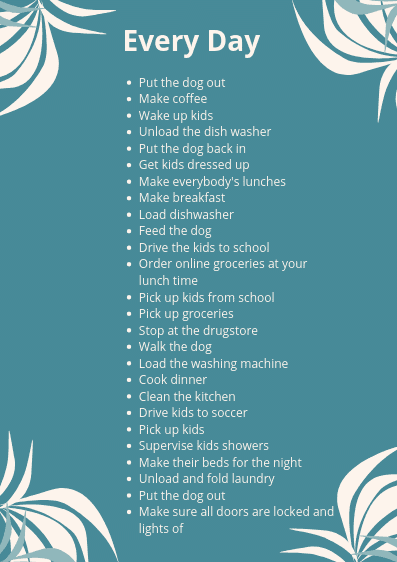How to Balance emotional Labor at Home
You get home after a long day, carrying some groceries for dinner. As soon as you open the door your kids come running to you, telling stories of their day, the dog joins them, wagging happily and you need to pee so bad.
Instead, you kiss the kids and put the dog out, while grabbing some jackets that were left on the floor, by the front door.
Now your husband calls you to see something he is watching on TV and you just glance at the overflowing sink when walking through the family room.
You watch for a few seconds and are just heading off to the washroom when your cell phone rings with a message about the school meeting.
You need to pee so bad but instead, write down the notes about the school meeting, before you forget, on the kitchen countertop, where you see a jar of milk sitting there. You put it back in the fridge and now you really, really need to pee.
While in the washroom, the kids are talking to you and the dog is barking. You get out of the washroom and see your husband still very entertained with the TV.
Does it sound familiar?
Even if you haven’t heard yet the expression “emotional labor at home”, if you could see yourself in that position I just described, I am sure you just understood the definition of emotional labor and you are one of millions of women living in a constant emotional labor state.
It is probably your everyday life, in case you’re in a relationship and or have a family. You do it so automatically that you don’t realize how much effort you put on it. This called emotional labour at home.
What is emotional Labor
Emotional labor at home is described as the invisible group of countless actions and mental work required to keep your household working. This “labor” is mostly done by women every day. It is your endless “to-do” list.
Actually, more than that, emotional labor it is every bit of effort, thinking and action you put towards keeping your household and family functioning. It might be that you’re not even aware of the hundreds of mini-actions, plans, and initiatives that you perform every day.
Think about your Emotional Labor
How do you feel about your own emotional labor?
What is your own emotional labor definition?
Venting is not enough!
Taking some actions about it. What can you do about it?
Your life deserves to be easier!
How to lessen the burden of Emotional Labor ?
1- Make it visible
Women have a list of to-do things in their mind. They wake up in the morning and start taking off, without thinking, they just do what they have to get ready to start the day.
Make your to-do list visible, writing it down on a board in the kitchen, the day before. Add everything you do in the house, starting in the morning up to the evening.
Here’s an example of what you might be doing every day :
By making it visual, your partner will know exactly what is the load of your day and can make his decision on what he will commit to share with you.
It should be simple but in fact it is not. Some confusions and heated discussions might happen. One of the most common arguments is: “I don’t believe you added turning the lights off in evening in this list, it is such a small thing!”.
2- Don’t try to solve problems that aren’t yours
Don’t fall into the trap of solving your partner’s problems for them. If your husband asks you to make an appointment at the dentist for him, give the phone number of the dentist’s office.
3- Don’t act like a control freak
It is vey common that women become so used to take care of every aspect of the household duties that they unconsciously start to try to control everything that everybody does. Like playing the home police role.
Sometimes they go as far as demanding that all tasks should be done in a certain way, their way of doing the task.
For example, I had a friend that couldn’t accept that whoever was helping her to clean the kitchen, wouldn’t start loading the dishwasher first, but cleaning the stove instead.
They can’t accept the fact that they don’t need to be in “control” all the time because the main goal is to have the task completed. It is not important “how” the chore will be completely, what it is really important is that task is done.
They have a hard time delegating, yet keep complaining a lot about their heavy load.
3-Lower Your standards
Learning to delegate means accepting that the other person doing the job, will do it “her/his” way. Therefore the floors might not be as clean as you would want it, for example. Understanding that there is more than ONE way of cleaning the sink or putting things away, will make your life easier and you will be ready to share the household duties.
4- You shouldn’t need to ask for initiative
When you say “can you help me with this?” you’re implying that you are the sole responsible for that job and many times the other person will feel that is ok to say no or to delay “the help”.
I came up with a solution for this. I tell to my husband that we have 2 tasks to be done. I say that I will do one and he will do the second one. I put in a way that has no doubts we’re both doing things that have to be done.
Sometimes I agree to switch tasks, but I try not to give any no room for negotiation. We both must do.
I also don’t like to say “I need you to do this”, because, again, it resonates like I “own” the task alone.
In reality, we both own any task related with the household duties.
4- Don’t put yourself in the position of the middle man
In my quest to make my life easier and balance my emotional labor, I decided to take all my husband dressed shirts to the dry cleaner. I also hired a dog trainer/walker and a cleaning lady.
The problem was though, that I was the one driving to the dry cleaner, dealing with the dog trainer and organizing the schedule with the cleaning lady. I didn’t realize at the time, because I was so happy to have someone doing those tasks for me, but I was again carrying the load of dealing with all the services that we hired.
Now I assign the dry cleaner task to my husband and also dealing with the dog trainer. I deal with the cleaning lady.
5- Don’t feel guilty, ever!
After centuries of living in a culture where women were responsible for all household duties, it is still ingrained in many of us, that the full household care is expected from us.
The millenial generation is way more comfortable with sharing jobs at home than the previous generations, but it also boils down to the family dynamics in which we all grew up.
I saw my Japanese dad sharing a lot with my mom in Brazil, back in the day, which was totally unexpected. Japanese men from his generation were very traditional and the Brazilian culture of male dominance would only exacerbate the culture of women doing all the emotional labor.
My dad was the one doing the groceries, looking after the dogs, preparing all the fruit we consumed, getting breakfast and our lunches ready, looking after all my mom pills and ever buying her cigarettes every day.
By seeing my dad sharing so many household tasks with my mom I always thought that this was a natural dynamic for a family.
However, many times I still fall for the trap of doing way more than I need, just because I do it faster or “I” think I do it “better”.
Whatever your upbringing was, what is important is to realize that you “might” still feel guilty about doing less. It is now time to let the guilt go and embrace sharing in equal parts.
6- The Secret Tip: Start the conversation on how can life at home be easier for everyone
Emotional Labor is becoming more and more related with feminism although there is some confusion about the concept. Gemma Hartley, made the term emotional labor very popular with her book titled Fed Up: Emotional Labor, Women, and the Way Forward, based on her viral Harper’s Bazaar article.
According to Hartley, “Emotional labor, is emotion management and life management combined. It is the unpaid, invisible work we do to keep those around us comfortable and happy. It envelops many other terms associated with the type of care-based labor: emotion work, the mental load, mental burden, domestic management, clerical labor, invisible labor.”
Culturally women have always been forced to adapt faster and most times, they were capable of doing it. Biologically their bodies go through many changes over the years and they have no other choice but to adapt.
However it doesn’t mean that they have to adapt to endure a heavier emotional load by managing the house and the family just because seems easier for them.
This complex and invisible work should be shared with their husbands or partners making life easier for everybody. The consequence is that everyone will have more time to do the things they like, to rest and relax. It is all about fairness.
I really don’t see an easy solution for the emotional labor in a family, other than talking honestly about what it is to be shared.
In my case, after many years of marriage, my husband and I have realized that we both have a different set of skills that are useful in the management of our house in different ways. He is the handy man, the one who will fix broken things, build, landscape, deal with all aspects of our financial life, etc. I am the manager of the daily tasks and I am very good at looking at the big picture of our routine and defining what has to be prioritized, how and when.
As far as cooking, for example, we are comfortable with sharing 70% to 30%. I like to cook, so I do more. Whoever is not having a good day, physically, gets to do less. I look after our 3 dogs by myself, during the days that he is away working, so when he comes back, he is the one who does the duty.
It hasn’t been always this way, it took us many years, several misunderstandings and some fights to be where we are. Two adults should be mature enough to find a clear and healthy path on sharing their daily tasks together and with the whole family. Emotional Labor is real but should be shared.
At this point in our Western society, women will have to lead the way in having the conversations that will make life easier and nicer for everyone, setting the ground work for future generations.



